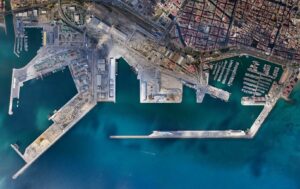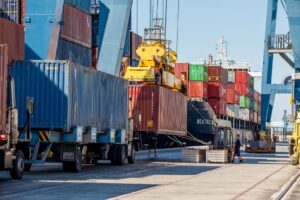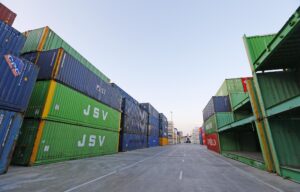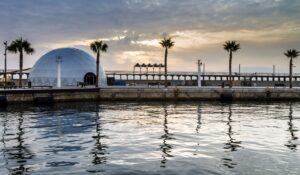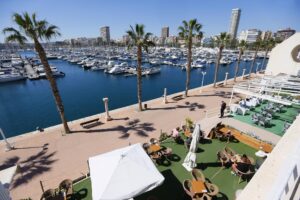-
Port Authority
-
Port Authority
Dependent on State Ports, it is the public body in charge of managing one of the 46 Spanish ports of general interest: the port of Alicante.
-
Port Authority
-
Port Community
-
Port Community
A comprehensive vision is essential to improve productivity and connectivity, the Port Community integrates all participants in logistics and business operations
-
Port Community
-
Deal
-
Deal
The port is essential in the logistical gear of the province, and of the state economy. We are always connected to offer you solutions.
-
Deal
-
Sustainable innovation
-
Sustainable innovation
The port is a space for open innovation, learning development, collaborative work and a cooking workshop
-
Sustainable innovation
-
Environment
-
Environment
One of the strategic priorities of the Port Authority is caring for the environment and optimizing port activities focused on sustainability
-
Environment
-
City port
-
City port
Alicante, a seafaring city, has grown through the centuries strengthened by its port. Its climate, the sun, places open to the city, to enjoy them, to walk them, to live them.
-
City port
Institutional information
The Port Authority of Alicante, like the other Port Authorities, is governed by Royal Legislative Decree 2/2011, of 5 September, which approves the Consolidated Text of the Law on State Ports and the Merchant Navy.
The Port Authority of Alicante is a public body within the meaning of Article 2(1)(g) of the General Budgetary Law, with its own legal personality and assets, as well as full capacity to act.
It depends on the Ministry of Mobility, Transport and Urban Agenda, through Puertos del Estado, which is governed by its specific regulations, by the provisions of the General Budgetary Law and by the provisions of the General Budgetary Law that are applicable to it.
Budgetary Law applicable to it and, additionally, by Law 40/2015, of 1 October, on the Legal Regime of the Public Sector.
Powers of the Port Authority of Alicante.
The Port Authority of Alicante has the following powers:
- The provision of general services, as well as the management and control of port services to ensure that they are carried out under optimum conditions of efficiency, economy, productivity and safety, without prejudice to the competence of other bodies.
- The development of the port service area and port uses, in coordination with the competent Administrations in matters of territorial planning and town planning.
- The management of the port public domain and maritime signals assigned to them.
- The optimisation of economic management and the profitability of the assets and resources assigned to them.
- The promotion of industrial and commercial activities related to maritime or port traffic.
- Coordination of the operations of the different modes of transport in the port area.
- The organisation and coordination of port traffic, both maritime and land.
Functions.
1. In order to exercise the management powers attributed by the previous article, the Port Authorities shall have the following functions:
- Approve the draft operating and capital budgets of the Port Authority and its multi-annual action programme.
- Manage the general services and those of maritime signalling, authorise and control port services and the operations and activities that require their authorisation or concession.
- To coordinate the actions of the different bodies of the Administration and entities in which it has a shareholding, which carry out their activities in the port area, except when this function is expressly attributed to other Authorities.
- To organise the uses of the service area of the port, and to plan and programme its development, in accordance with the approved land and urban planning instruments.
- To draw up and formulate the special development plans for the port service area, in development of the general urban planning.
- To design and construct the necessary works within the framework of the approved plans and programmes.
- To draw up, where appropriate, the plans of objectives with a time horizon of more than four years, in accordance with the provisions of Article 18.1.a).
- To approve the investment projects included in the approved programming, as well as the expenditure corresponding to said investments, and to contract their execution.
- To report on the draft Port Operation and Police Regulations, and to draw up and approve the corresponding Port Ordinances with the formalities and requirements established in Article 295, as well as to ensure compliance with the same.
- Control, in the port area, compliance with the regulations affecting the admission, handling and storage of dangerous goods, as well as the security and protection systems against terrorist and anti-social actions, against fires and for the prevention and control of emergencies under the terms established by the regulations on civil protection and the fight against marine pollution, without prejudice to the competencies corresponding to other bodies of the Public Administrations, as well as collaborate with the competent Administrations on civil protection, fire prevention and extinction and rescue.
- To freely approve the tariffs for the commercial services they provide, as well as to apply and collect them.
- To grant concessions and authorisations and to draw up and keep up to date the censuses and registers of uses of the public port domain. As well as granting licences for the provision of port services in the port service area.
- Collect the fees for the concessions and authorisations granted, monitor compliance with the clauses and conditions imposed in the granting act, apply the sanctioning system and adopt as many measures as may be necessary for the protection and proper management of the public port domain.
- Promote the training of its personnel and develop studies and research in matters related to port activity and environmental protection, as well as collaborate with other ports, organisations or companies, whether national or foreign.
- To inspect the operation of the maritime signals, the control of which is assigned to it, in the ports under the jurisdiction of the Autonomous Communities, reporting to the latter, as those responsible for their operation and maintenance, the problems detected for their correction.
- To manage its international trade policy, without prejudice to the competencies of the Ministries of Economy and Finance and of Foreign Affairs and Cooperation.
- To authorise the participation of the Port Authority in companies, and the acquisition and disposal of its shares, when the total commitments contracted do not exceed 1 per cent of the net non-current assets of the Port Authority and provided that these operations do not imply the acquisition or loss of the majority position.
The agreement of the Board of Directors must have the favourable votes of the majority of the representatives of the General State Administration present or represented, being, in any case, the favourable vote of the representative of Puertos del Estado necessary.
- The installation and maintenance of signalling, beaconing and other aids to navigation used for the approach and access of the vessel to the port or ports they manage, as well as the interior beaconing of the common areas. Excluded from this service is the installation and maintenance of signalling, beaconing and other aids to navigation of the installations granted in concession or authorisation, including those for marine crops and underwater emissaries, or other installations located in the marine environment that could represent an obstacle to navigation, which shall be carried out by the owner or person responsible for them.
- Promote that port infrastructures and services respond to an adequate maritime-terrestrial intermodality, by means of an efficient and safe road and rail network, adequately connected with the rest of the transport system and with the logistic nodes that may be considered to be of general interest.
- Manage the railway infrastructures they own, favouring adequate maritime-rail intermodality.
- Collect information on the services provided and the activities carried out in the service area of the ports they manage.
2. The Port Authorities must provide the State Ports with the information requested by the State Ports regarding the exercise of their functions in matters of planning, design and construction of works, management of the public domain through the granting of concessions and authorisations and the regulation and control of port traffic, the promotion of industrial and commercial activities related to port traffic, tariffs and their application and the coordination of the operations of the different modes of transport in the port area.
Functions of the Board of Directors
The Board of Directors has the following functions:
- To govern and administer the port, without prejudice to the powers corresponding to the Chairman.
- To delimit the functions and responsibilities of its bodies and to confer and revoke general or special powers of attorney to specific persons, both natural and legal, for those matters in which it is necessary to grant such powers.
- To approve, at the initiative of the President, the organisation of the entity and any modifications thereto.
- To establish its management rules and its internal operating rules, its economic regime and the functions of the Secretary.
- Approve the draft operating and capital budgets of the Port Authority and its multi-annual action programme, as well as their submission to Puertos del Estado for processing.
- Approve the annual accounts, which will include the balance sheet, the profit and loss account, the statement of changes in net assets, the cash flow statement, the annual report and the proposal, if appropriate, for the application of results, agreeing on the percentage of the same to be allocated to the constitution of reserves, in the amount necessary for the realisation of investments and for its adequate functioning.
- To authorise the entity’s investments and financial operations, including the incorporation of and participation in trading companies, subject to compliance with the necessary legal requirements.
- Approve projects involving the occupation of property and acquisition of rights referred to in Article 61 of this Act, without prejudice to the technical approval of the same by a competent technician.
- To exercise the police powers attributed to it by this Act, and which are necessary for the fulfilment of its purposes.
- To set the annual management objectives, within the framework of the global objectives established by Ports of the State for the system as a whole.
- To propose the financial operations of assets or liabilities whose approval corresponds to Puertos del Estado, within the framework of the investment, financing and indebtedness plans approved by the Government and the Cortes Generales for this Public Body.
- To authorise credits for the financing of working capital.
- To set the tariffs for the commercial services provided by the Port Authority.
- To grant concessions and authorisations, in accordance with the criteria and General Conditions approved by the Ministry of Public Works, to collect fees for private use or special exploitation of the public port domain and for the provision of the maritime signalling service.
- ñ) Approve those agreements, pacts, conventions and contracts that the Council itself determines to be within its competence, due to their importance or subject matter.
- To agree on the exercise of actions and appeals corresponding to the Port Authorities in defence of their interests before the Public Administrations and Courts of Justice of any order, level or jurisdiction. In urgent cases, this power may be exercised by the President, who shall immediately report to the Board of Directors at its first meeting.
- Favour free competition and ensure that no monopoly situations arise in the provision of the different port services.
- To carry out as many acts of management, disposal and administration of its own assets as are deemed necessary.
- Approve the Port Ordinances, subject to the provisions of Article 295 of this Act.
- Exercise the other functions of the Port Authority established in article 26 of this law not attributed to other governing or management bodies and not mentioned in the previous sections.

